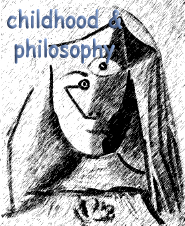lipman and philosophy for children: cultivating “thinking” or cultivating “one” thinking?
DOI:
https://doi.org/10.12957/childphilo.2020.49438Keywords:
philosophy and education, philosophy for children, lipman, thinking.Abstract
This text aims to perform a “fly over” the Philosophy for Children program--created by the philosopher and educator Matthew Lipman-–in order to identify certain philosophical problems that might appear there, one of them being the issue of universality. In response to Lipman’s claims of universality, we try to uncover his underlying ideological position that informs his approach to the concept. To achieve that goal, we return to the program’s beginnings, in order to ask how the idea of Philosophy for Children appeared and how it has developed up to the present moment. We argue that Lipman’s novel proposal to think philosophically with children emerged, in part, as a response to the student movements of 1968--a response, that is, to a specific political context that was marked by strong social and ideological disputes. Finally, we make a comparative analysis of the social and political context that informs Latin American Philosophy, and the extent to which it, also, has been shaped by a pragmatic response to a particular historical moment. The difference between the Anglo-American and the Latin American contexts is here characterized as an obstacle to a certain “universal” logos to which the Lipmanian project is linked. Our analysis is aided by the Discourse of marginalization and barbarism, produced by the Mexican philosopher Leopoldo Zea.
References
BOSI, Alfredo. Ideologia e contraideologia: temas e variações. São Paulo: Companhia das Letras, 2010.
CALDERA, Alejandro Serrano. Filosofia e Crise - Pela Filosofia Latino-americana. Petrópolis: Vozes, 1984.
DEWEY, John. Democracy and education. Stilwell, KS: Digireads, 2005.
DEWEY, John. Experiência e natureza e outras obras. São Paulo: Abril Cultural, 1980.
GHIRALDELLI Jr., Paulo. O que é Pragmatismo – São Paulo : Brasiliense, 2007.
GADOTTI, Moacir. História das Ideias Pedagógicas. São Paulo: Ática, 2002.
GALEANO, Eduardo. As Veias Abertas da América Latina: tradução de Galeano de Freitas, Rio de Janeiro, Paz e Terra (Estudos latino-americanos, v. 12), 1998.
JOHANSSON, Viktor. Philosophy for children and children for philosophy: Possibilities and problems. In: Smeyers P. (eds) International Handbook of Philosophy of Education. Springer International Handbooks of Education. Springer, Cham, 2018.
KOHAN, Walter Omar. Filosofia para Crianças: a tentativa pioneira de Matthew Lipman – Petrópolis, RJ : Vozes, 1998.
KOHAN, Walter Omar. Filosofia para Crianças – 2. ed. - Rio de Janeiro: Lamparina, 2008.
LIPMAN, Matthew. O pensar na educação. Trad. Ann Mary Fighiera Perpétuo. 3 ed. Petrópolis: Vozes, 1995.
LIPMAN, Matthew. A filosofia vai à escola. Tradução de Maria Elice de Brzezinski Prestes e Lucia Maria Silva Kremer]. – São Paulo : Summus, 1990.
LIPMAN, Matthew & SHARP, Ann M. Teaching children philosophical thinking. New Jersey: Universal Diversified Service, 1975.
LOCKE, John. Dois Tratados sobre o Governo Civil. Os Pensadores . São Paulo, Ed. Nova Cultural, 1991.
MANNHEIM, Karl. Ideologia e utopia. 2a. ed. Rio de Janeiro: Zahar Editores, 1972.
MARX, Karl & ENGELS, Friedrich. A ideologia alemã. São Paulo: Boitempo Editoria, 2007.
RIBEIRO, Darcy. (2010). A América Latina existe? Rio de Janeiro: Fundação Darcy Ribeiro; Brasília, DR: Editora UNB., 2010.
SILVEIRA, Renê José Trentin. A filosofia vai à escola? Contribuição para a crítica do Programa de Filosofia para Crianças de Matthew Lipman. Campinas, SP: Autores Associados, 2001.
SHOOK, John R. Os pioneiros do pragmatismo americano. Trad. Fabio M. Said. – Rio de Janeiro: DP&A, 2002.
WITTGENSTEIN, Ludwig. Tractatus Logico-Philosophicus. Trad. e apres. José Arthur Giannotti. São Paulo: Ed. da USP, Companhia Editora Nacional, 1968.
ZEA, Leopoldo. Discurso desde a marginalização e a barbárie; seguido de, A filosofia latino-americana como filosofia pura e simplesmente. Tradução de discurso, Luis Gonzalo Acosta Espejo e Maurício Delamaro. Rio de Janeiro: Garamond, 2005.
LEMANN, Nicholas. How the Seventies Changed America. American Heritage, 42 (July/August 1991), 39-42, 44, 46, 48-49. Reprinted by permission of American Heritage magazine, a division of Forbes Inc. Copyright Forbes Inc., 1991. Disponível em: <http://webcache.googleusercontent.com/search?q=cache:0WJNVYxMmRkJ:wp.lps.org/kbeacom/files/2012/08/How-the-1970s-changed-America.pdf+&cd=1&hl=pt-BR&ct=clnk&gl=br&client=safari>. Acessado em 31/08/2019.




